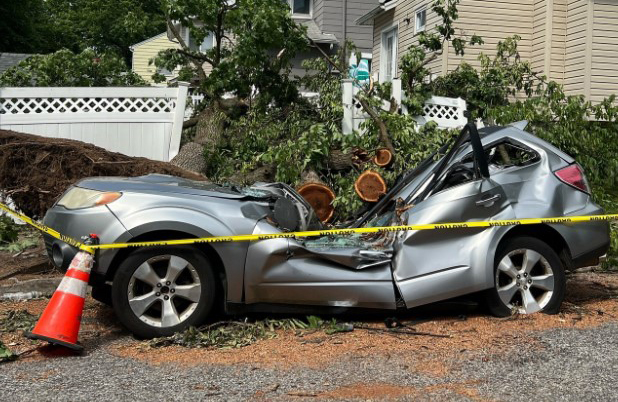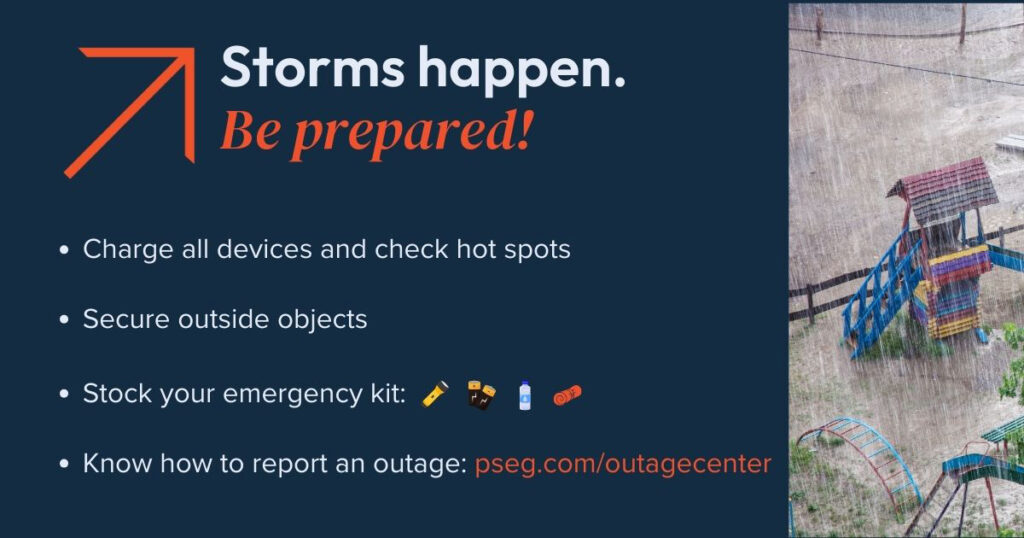PSE&G said it’s ready for the extreme weather that could be headed to the Greater Meadowlands Region and is prepared for possible thunderstorms that could bring gusty winds and rain throughout its service area Wednesday (June 26) into Thursday (June 27).
The weather system could bring hazardous wind gusts (40 to 50 MPH) across the service area — enough to potentially topple trees, bring down branches on wires and cause outages. PSE&G reports.

“We encourage customers to take the time now to prepare; know how to stay safe before, during and after a storm and know how to report an outage before it happens,” the company said in a statement.
Customers can lookup outages here. The map offers
- Real-time outage and restoration information
- Location (County/Town details) of power outages reported by customers
- Number of customers impacted
PSE&G is Prepared
In advance of the storm, PSE&G crews are performing system and logistics checks to ensure the availability of critical materials, fuel and other supplies to fulfill our commitment to bring customers safe and reliable service regardless of extreme weather conditions.
“PSE&G is closely monitoring this latest weather front and we are once again prepared for potential impacts on the system,” said John Latka, senior vice president, PSE&G Electric Operations, Transmission & Distribution.
“We have crews scheduled 24/7 who will be ready for restoration once weather conditions permit. Our crews will work to safely restore any outages as quickly as conditions will allow,” Latka said.
Ongoing Efforts
PSE&G said it prepares year-round for extreme weather to maintain reliable service for customers. Eleven years after Superstorm Sandy raged across the East Coast, PSE&G continues to work to protect customers’ utility service from the damaging impact of extreme weather by strengthening and upgrading its infrastructure.
“Our investments in new infrastructure have helped us remain one of the nation’s most reliable utility companies. In fact in December 2023, J.D. Power named PSE&G number one in customer satisfaction with residential and business electric service in the east among large utilities,” according to a statement.
How To Be Prepared in Advance of a Storm
Stay connected: Know how to report a power outage. These tools help us stay connected during an outage by sharing valuable information and status updates.

- Download the PSE&G mobile app to report outages and receive information on restoration times, crew locations and more.
- Register for MyAlerts to receive text notifications at pseg.com/outagecenter.
- Report an outage and receive status updates by texting OUT to 4PSEG (47734). You can also report your outage through our app or on our website at pseg.com/myaccount.
- Follow PSE&G on Facebook, Instagram (@PSEG) and Twitter (@PSEGdelivers) for updates before, during and after the storm.
- Visit PSE&G’s Outage Map for the latest in outage info, restoration times and crew locations across New Jersey at pseg.com/outagecenter.
- To report an outage by phone, call PSE&G at 1-800-436-PSEG (7734).
Storm Safety: Plan ahead before bad weather hits. Learn how to stay safe before, during, and after a storm.
- Downed wires should always be considered “live.” Stay at least 30 feet away from downed lines, and don’t go near the pole or anything touching the line. Immediately contact PSE&G, at 1-800-436-PSEG (7734), via our mobile app or our website, to report downed wires and dial 911 if an immediate hazard exists.

- Electric current passes easily through water, so stay away from downed power lines and electrical wires. Don’t drive over – and don’t stand near – downed power lines.
- Downed lines can potentially be hidden in standing water. If you encounter large pools of standing water, stop, back up and choose another path.
- To prevent carbon monoxide poisoning, do not run any gasoline-powered generators in a garage or any other enclosed space.
- If you are on life-sustaining medical equipment, ensure that you alert PSE&G in advance and notify your local police and fire departments. For more information, visit www.pseg.com/life.
Flood Safety: Whether it’s melting snow or powerful rainstorms, New Jersey has experienced increased floods and it’s important for you to familiarize yourself with flood safety by visiting: pseg.com/Flood, including how to recognize an overheated or “runaway” boiler.
If you notice water rising nearby or you are planning to evacuate:
- Unplug all of your electrical appliances.
- Shut off the natural gas supply valve to any gas appliances. The valve is usually found on the gas line to the appliance. Do not attempt any further work until this has been done.
If your home/business is flooding:
- Remember that pools of water may become electrically charged. Appliances in standing water may also become charged, so do not touch them after they have become surrounded by water.
- If you can do so safely, turn off air conditioners or major appliances that may have been running when the outage occurred. This will help avoid a sudden surge of power when electric service is restored.
- Call PSE&G immediately at 1-800-880-7734 (PSEG) or 911 if you smell gas.
- Don’t go into basements with standing water, raw sewage or obvious electric hazards. Stay away from the breaker box in a flooded basement.
- Watch out for animals and snakes that may have been flooded out of their homes and are seeking shelter.
Review additional storm safety and preparation tips at https://nj.pseg.com/safetyandreliability/stormsafety.












